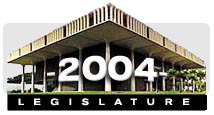
Education bill adjusts
principals’ functionThe changes give them stronger
roles with school councils
Legislators plan to amend a new education law today in response to some of Gov. Linda Lingle's concerns but are postponing her push to give schools control of 90 percent of the education budget.
Rep. Roy Takumi (D, Pearl City-Pacific Palisades) and Rep. K. Mark Takai (D, Newtown-Pearl City) released yesterday the results of an unscientific survey that showed strong resistance among principals to the 90 percent figure, which would entail managing services such as school food and transportation in addition to academics.
"Principals are telling us the temperature of the food in the cafeteria doesn't have much to do with student achievement," Takumi said. "They don't want the responsibility for it."
The "Reinventing Education Act of 2004" calls for decentralizing the Department of Education by giving principals responsibility for at least 70 percent of school operating funds and creating school councils to give the community more say in their local schools.
Legislators overrode the governor's veto of that bill, and it is now law. But they worked with the administration to fashion several changes that are poised for final approval today as House Bill 2002, CD2. These include clarifying a stronger role for principals with the councils, testing a "weighted student formula" in 15 schools statewide starting in January, and allowing charter schools to choose to use that formula.
The bill says the school councils -- made up of parents, teachers and school staff -- will review and approve the school's academic and fiscal plan, rather than develop it, as the original legislation says. Takumi said the legislation will empower principals while allowing for collaboration.
"What we are proposing is no different than the governance structure that exists in corporations and nonprofit organizations, not to mention charter schools," he said.
Lingle had asked legislators to make the councils merely advisory. Her policy adviser, Linda Smith, said the new language is an improvement, but "it's clearly not as much as we had hoped for."
"We would have liked to have given the principals full scope in being able to manage the schools in the way they believe would result in student success," she said. "We really would have liked to have seen in statute going to the full 90 percent."
The bill has broad bipartisan support and is expected to be approved today. Only House Minority Leader Galen Fox (R, Waikiki-Ala Moana) voted against it on Monday.
The survey of principals was sent by e-mail on April 28 by Takumi and Takai to 252 public school principals statewide. Sixty percent, or 152 principals, responded.
Asked whether they agreed with the governor that principals should have control of 90 percent of the Department of Education's operating budget, 78 percent disagreed or strongly disagreed, with just 5 percent agreeing or strongly agreeing. A common theme in their written comments was their desire to be instructional leaders, rather than business managers.
"I am concerned that my time will be given to noneducational responsibilities and take away too much time from focusing on student achievement," wrote Lindsay Ball, principal of King Kamehameha III School in Lahaina. "I don't want to have to worry about the grass being mowed, bus services and other such items."
Eleanor Laszlo, principal of Kohala Elementary School on the Big Island, agreed. "Good grief! I have enough on my plate already," she said. "I want to focus on my students and my teachers and staff."
The principals also called for more training to help them handle their new responsibilities if they are given more resources and autonomy, with 89 percent in favor and 6 percent saying more training was not needed.
Sen. Bob Hogue (R, Kaneohe-Kailua) said the opinions expressed by the principals are to be expected because they are shaped by the system in which they work.
"I'm not surprised by the results of the survey because, let's be real honest here, the principals have been kind of indoctrinated by people within the system who don't want to see change," he said. "Whenever there's talk of change, there's going to be apprehension, anxiety and sometimes fear."
But Hogue said he was heartened by the cooperative spirit that emerged on education reform over the past week, after a contentious legislative session.
"The governor threw the ball on the other side of the court, and the players on the other side picked it up and worked with her to achieve some sort of compromise," Hogue said. "That's historic in Hawaii."
BACK TO TOP |
Principals give feedback
A survey was sent April 28 via e-mail by state Reps. K. Mark Takai and Roy Takumi to 252 principals in Hawaii's public schools, asking whether they agreed with the statements below. Sixty percent, or 152 principals, responded.>> The governor's proposal to replace a statewide school board with at least four (or seven) school boards will improve student achievement.
Agree or strongly agree: 2 percent Disagree or strongly disagree: 87.5 percent Neither agree nor disagree, or blank: 10.5 percent
>> I support the governor's proposal that a minimum of 90 percent of the Department of Education's operating budget must be controlled by the principal. (This would mean that principals will be directly responsible for transportation, special education, food service, adult education, A+, etc.)
Agree or strongly agree: 5 percent Disagree or strongly disagree: 78 percent Neither agree nor disagree, or blank: 17 percent
>> Giving principals more resources and greater flexibility and autonomy will improve student achievement at my school.
Agree or strongly agree: 67 percent Disagree or strongly disagree: 8 percent Neither agree nor disagree, or blank: 25 percent
>> If schools receive more resources and greater flexibility and autonomy, there must be additional training provided for planning and managing the use of resources.
Agree or strongly agree: 89 percent Disagree or strongly disagree: 6 percent Neither agree nor disagree, or blank: 5 percent
Source: State Reps. K. Mark Takai and Roy Takumi

